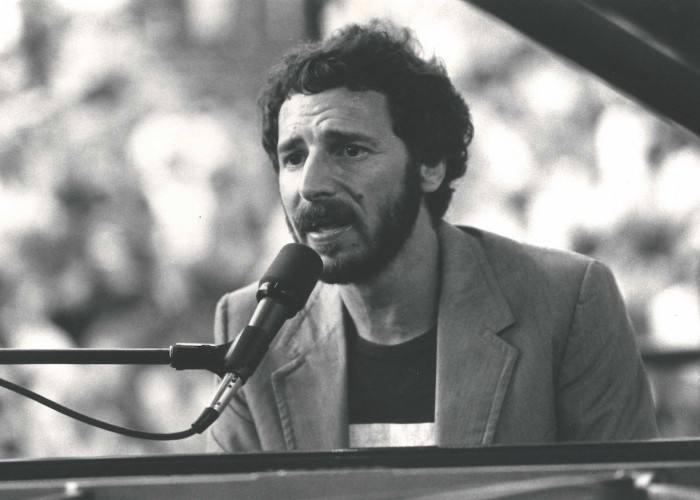Jan 13, 2026 2:09 PM
More Trump-Kennedy Center Cancellations
The fallout from the renaming of the John F. Kennedy Center for the Performing Arts to include President Donald…

Ben Sidran’s latest release is a compilation of live recordings made between 1975 and 2015.
(Photo: Courtesy of Archives of Ben Sidran at the University of Wisconsin-Madison)When Ben Sidran first met McCoy Tyner at the New York club Slugs’ during the late 1960s, Sidran was in awe—and he made that clear to Tyner. But the keyboard titan was having none of it.
“I realized I was putting him on a pedestal, because I thought he was superhuman,” Sidran, 75, recalled. “And he was telling me, ‘Look, we all pull on our pants one leg at a time. We’re all out here doing this. You find what you can do and you do that.’ And that’s what I followed.”
Much of Sidran’s subsequent voyage of self-discovery is documented in Ben There, Done That (Sunset Boulevard), a new three-CD collection consisting of 27 tracks of previously unissued live performances encompassing 40 years of his career.
The period is bounded by the opening two tracks on Disc One. The first, an instrumental recorded at a 1975 radio broadcast in Minneapolis, finds the pianist drawing from the jazz songbook. Backed by Curley Cooke on guitar, Gary Zappa on bass, Bill Meeker on drums and Rick Becker on percussion, Sidran unleashes a fiery rendition of Dizzy Gillespie’s “Birks’ Works” that, for all its sizzle, he now views as slightly lacking in maturity.
“I was in the process of trying to discover and in some ways invent myself,” he said. “I did not know who I was in terms of the music.”
In contrast, the second track, the original “The Groove Is Gonna Get You,” is, by his own account, far more self-aware. Recorded at the Paris club Sunset/Sunside in 2015, the track features Bob Rockwell’s saxophone, Billy Peterson’s bass and son Leo Sidran’s drums—all in support of Ben’s singular synthesis of vocal influences, from American rap to European sprechgesang.
Sidran’s stripped-down, groove-based vocal arrangements grew out of an attempt to spur a sense of community during the administration of President George W. Bush. “It’s called the heartbeat connection,” he said, likening the cadence of a pumping heart to that of a rhythmic shuffle. “When you put that down in a room, people start coming together.”
The approach, he said, owed much to the presence of his son. Before bringing Leo into the band around the turn of the millennium, his arrangements often featured a palette broadened by the inclusion of a synthesizer player. On this collection, Ricky Peterson, who appears on five tracks recorded at the Osaka Blue Note and the Tokyo Quatro in 1991, occupies that role.
“It was of its time, really the mid-’80s to mid-’90s,” he explained. “That was the way we orchestrated, as opposed to using a string section. Once we had the ability to orchestrate, everybody wanted to go out and hit it.”
But, he added, that approach ran its course. “Leo’s responsible for my music taking the turn it did. When Leo started playing, the music settled down. Instead of trying to create these atmospheres, it became about getting in the pocket, sitting in the pocket, making that pocket drive what happens.”
For Leo, who first joined his father in the 1990s as a tech aid on tour with Steve Miller—Ben’s collaboration with Miller dates from the 1960s, when he co-wrote the hit “Space Cowboy” with the rock guitarist—the working relationship has proved a multidimensional experience.
“There is a lot of humor, of joy, even a sense of joy in tragedy,” Leo said. “Ben has always had a mantra of having serious fun.”
The fun, and camaraderie, continues. In November, the father and son—along with bassist Peterson, whom Leo, 42, has known his whole life—played a series of freewheeling dates in Europe that suggest a late marker in Ben’s search for who he is.
“The three of us are sometimes like one mind,” he said. DB

Belá Fleck during an interview with Fredrika Whitfield on CNN.
Jan 13, 2026 2:09 PM
The fallout from the renaming of the John F. Kennedy Center for the Performing Arts to include President Donald…

Peplowski first came to prominence in legacy swing bands, including the final iteration of the Benny Goodman Orchestra, before beginning a solo career in the late 1980s.
Feb 3, 2026 12:10 AM
Ken Peplowski, a clarinetist and tenor saxophonist who straddled the worlds of traditional and modern jazz, died Feb. 2…

The success of Oregon’s first album, 1971’s Music Of Another Present Era, allowed Towner to establish a solo career.
Jan 19, 2026 5:02 PM
Ralph Towner, a guitarist and composer who blended multiple genres, including jazz — and throughout them all remained…

Rico’s Anti-Microbial Instrument Swab
Jan 19, 2026 2:48 PM
With this year’s NAMM Show right around the corner, we can look forward to plenty of new and innovative instruments…

Richie Beirach was particularly renowned for his approach to chromatic harmony, which he used to improvise reharmonizations of originals and standards.
Jan 27, 2026 11:19 AM
Richie Beirach, a pianist and composer who channeled a knowledge of modern classical music into his jazz practice,…